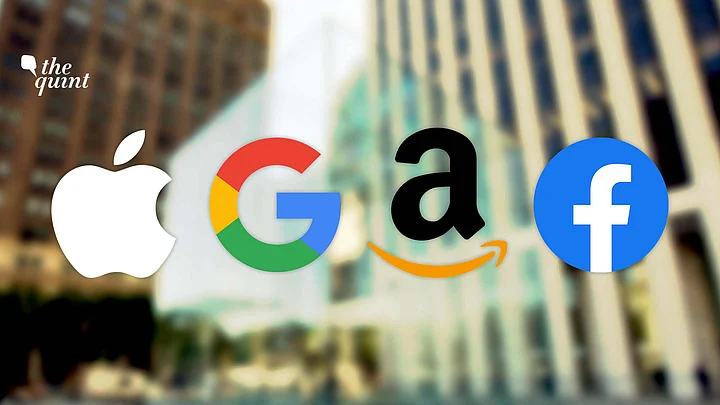A 16-month investigation into the monopolistic practices by some of the biggest tech companies in the world like Apple, Google, Facebook and Amazon has revealed that these firms enjoy monopolistic powers in the industry and checks and balances need to be enforced.
According to a CNBC report, the Democratic congressional staff recommended changes to the antitrust laws that could bring about changes to the organisational structure of these companies such as separating parts of their businesses or making it tougher for them to buy smaller, competitive companies.
The 450-page report lays down the key takeaways from the hearings, interviews and also the 1.3 million documents that they had to scour through during the investigation.
Here’s a look at some of the key recommendations that the Democratic staff have included in the report:
- Breaking up the company or imposing business structures that make different lines of businesses functionally separate from the parent company. This way you can restrict dominant businesses from entering adjacent lines of businesses. Example: The changes could force Google to divest YouTube or similarly Facebook can be asked to separate from Instagram or WhatsApp.
- Antitrust agencies can be instructed to consider mergers by dominant platforms to be anti-competitive and then make it necessary for the merging parties to prove that it would not harm the competition.
- Preventing dominant platforms from referencing their own products and services and instead of making them offer “equal terms for equal services.”
- Requiring dominant firms to make their services compatible with the competition so that data transfers can take place between them so there is no monopoly of user data utilisation.
- Increasing the budget for the Federal Trade Commission and the Department of Justice Antitrust Division.
Republicans have also voiced some of their objections regarding the changes to be made in the antitrust laws, mostly regarding the structural changes being forced on the companies.
Some of the members have expressed support for the increase in the funding of the Antitrust Committee but said that presumptive bans on mergers and mandates for data interoperability would stifle innovation.
Here’s a look at some of the key findings of the report fro each company:
Apple
The report says that Apple’s monopoly exists in the software app distribution on iOS devices although it also admits that the platform has given both developers and users “significant benefits.”
The report alleges that Apples uses its monopolistic powers “to exploit app developers through misappropriation of competitively sensitive information and charges app developers supra-competitive prices within the App Store.”
The most recent case being the lawsuit that Epic Games had filed against Apple for removing its Fornite multiplayer game from the App Store.
“In the absence of competition, Apple’s monopoly power over software distribution to iOS devices has resulted in harms to competitors and competition, reducing quality and innovation among app developers, and increasing prices and reducing choices for consumers,” the report said.
Facebook is a dominant player in the online advertising and social networking markets and the report says that it also enjoys monopoly power in these areas.
The acquisition of Instagram is also mentioned in the report and how Facebook in an attempt to get rid of the competition acquired Instagram in 2012.
The recommendations by the Democratic majority staff shed light upon some of these concerns that dominant companies like Facebook may be able to engage in “killer acquisitions” of competitors.
The report suggests that if Facebook does try to acquire a company in the future, it would have to prove their deals won’t harm competition.
Amazon
The report also alleges that Amazon has monopolistic powers over third-party sellers on its platform.
“Amazon has engaged in extensive anticompetitive conduct in its treatment of third-party sellers,” the report states. “Publicly, Amazon describes third-party sellers as ‘partners.’ But internal documents show that, behind closed doors, the company refers to them as ‘internal competitors’.”
Amazon during its recent testimony in front to the Antitrust Committee rebuked this claim saying that Amazon relies on the third-party sellers on its platform to run the entire ecosystem and it would not be in the best interest of the company to go against them.
The report argues that, “Amazon’s dual role as an operator of its marketplace that hosts third-party sellers, and a seller in that same marketplace, creates an inherent conflict of interest. This conflict incentivizes Amazon to exploit its access to competing sellers’ data and information, among other anticompetitive conduct.”
Google has a monopoly of the general online search engine and the search advertising markets, the report says.
With a plethora of services on offer and a large amount of user data sitting on its servers across the globe, Google is able to reinforce its dominance.
“Google exploits information asymmetries and closely tracks real-time data across markets, which—given Google’s scale—provide it with near-perfect market intelligence. In certain instances, Google has covertly set up programs to more closely track its potential and actual competitors, including through projects like Android Lockbox,” the report adds.
The report also goes on to say that Google has been “blurring the distinction between paid ads and organic results”. By doing this, it’s been able to siphon off large amounts of data traffic to its portals so that it can charge companies for ads.
It adds that Google also used “anticompetitive contracts” to maintain a strong stance in the online search market.
(At The Quint, we question everything. Play an active role in shaping our journalism by becoming a member today.)
